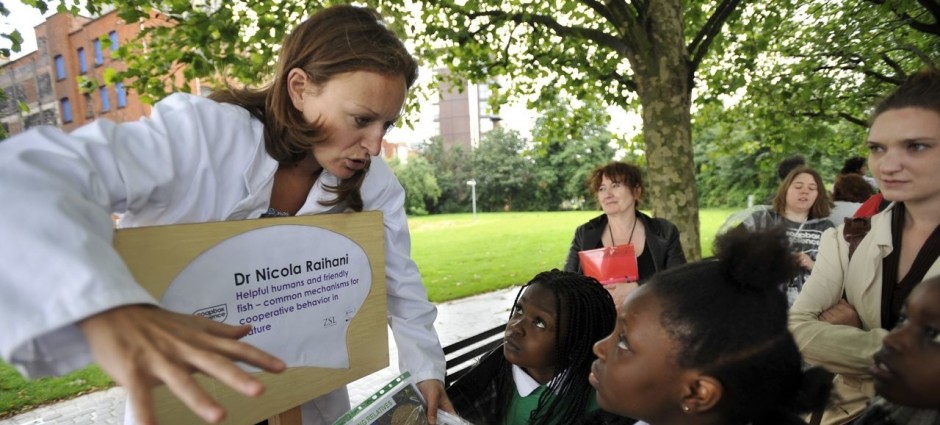 Hannah is a senior lecturer in Aberystwyth University, who works in computer vision. Her particular interests are shadows and shadow perception, the way light reflects of complicated surfaces (like faces and plants) and modelling and understanding the way in which things grow and change (like faces and plants). She also really enjoys teaching undergraduates and has a small collection of teaching awards. Hannah’s participation in Soapbox Science Cardiff is partly supported by BSC Women.
Hannah is a senior lecturer in Aberystwyth University, who works in computer vision. Her particular interests are shadows and shadow perception, the way light reflects of complicated surfaces (like faces and plants) and modelling and understanding the way in which things grow and change (like faces and plants). She also really enjoys teaching undergraduates and has a small collection of teaching awards. Hannah’s participation in Soapbox Science Cardiff is partly supported by BSC Women.
SS: How did you get to your current position?
HD: I read a lot of science fiction as a teenager, and William Gibson’s novel Neuromancer gave me a bit of an obsession with artificial intelligence (AI). So I did a BSc in cognitive science, then an MA in the philosophy of AI, then moved into computing and programming with a PhD in computer vision: the branch of AI which involves getting computers to see. From there I moved job a few times, working as a contract researcher in different universities, before ending up in Wales working as a lecturer at Aberystwyth.
SS: What, or who, inspired you to get a career in science?
HD: Books inspired me to study science in the first place. An interest in problem solving inspired me to take it beyond the BSc, and a love of teaching keeps me in the job when the research is going badly (which it inevitably does, from time to time).
SS: What is the most fascinating aspect of your research/work?
HD: Solving problems.
SS: What attracted you to Soapbox Science in the first place?
HD: I’ve done a lot of workshops in schools, and public science poster contests, but I quite like the idea of trying to explain computational concepts without computers. My work is very screen based, but thinking of ways to communicate it from a soapbox is really making me look at it differently.
SS: Sum up in one word your expectations for the day – excitement? Fear? Thrill? Anticipation?
HD: I haven’t yet developed a clear communication plan, so I guess I’d have to say trepidation at this stage. I’m sure that by the end of the day I’ll be fine though!
SS: If you could change one thing about the scientific culture right now, what would it be?
HD: In the UK, I’d get rid of the Research Excellence Framework (REF). Every researcher and every university spends weeks and weeks of time generating reports on research, when they could be doing actual research. Institutions play games (some departments only enter a tiny percentage of their staff so they can say that they are 100% “world leading”), and there’s an absurd transfer market which means that institutions are trying to buy staff based upon research output alone. Despite allowances it’s stacked against part-timers, those who’ve had career breaks, and those with significant admin loads. I’d also scrap the proposed TEF (Teaching Excellence Framework): the answer to game-playing and crushing bureaucracy in research management is not to introduce it to teaching management too.
SS: What would be your top recommendation to a female PhD student considering pursuing a career in academia?
HD: Be ready to travel. Working in different universities really opens your mind, so be ready for it and embrace it. It’s hard to be away from friends and families, but living and working in different cities and research communities really does make you a better scientist.
